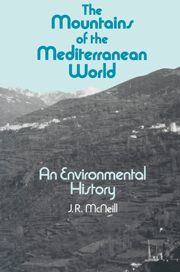Book contents
- Frontmatter
- Contents
- List of Illustrations and Tables
- Preface
- Note on Transliteration
- List of Abbreviations
- 1 The Argument: Ecology, Economy, Shells, and Skeletons
- 2 Mediterranean Mountain Environments
- 3 The Deep History of Mediterranean Landscapes
- 4 Material Life in the Mountain Environment, 1700–1900
- 5 Population, Settlement, and Landscapes
- 6 Political Economy and Mountain Landscapes
- 7 The Changing Landscape since 1800
- 8 Conclusion
- Bibliography
- Index
1 - The Argument: Ecology, Economy, Shells, and Skeletons
Published online by Cambridge University Press: 29 September 2009
- Frontmatter
- Contents
- List of Illustrations and Tables
- Preface
- Note on Transliteration
- List of Abbreviations
- 1 The Argument: Ecology, Economy, Shells, and Skeletons
- 2 Mediterranean Mountain Environments
- 3 The Deep History of Mediterranean Landscapes
- 4 Material Life in the Mountain Environment, 1700–1900
- 5 Population, Settlement, and Landscapes
- 6 Political Economy and Mountain Landscapes
- 7 The Changing Landscape since 1800
- 8 Conclusion
- Bibliography
- Index
Summary
I have loved the Mediterranean with a passion, no doubt because I am a northerner like so many others in whose footsteps I have followed.
Fernand BraudelThe Mediterranean world has a special beauty to it. The stark light, the soaring mountains, the sparkling sea, and much else contribute to make landscapes that have long attracted people from afar. Dr. Johnson once said that the grand object of all travel is to see the shores of the Mediterranean. Apparently little has changed since the eighteenth century: today one-third of all international tourism in the world involves Mediterranean countries. But in fact a good deal has changed, including the landscapes themselves.
The beauty of the Mediterranean mountains is in a way a sad one. Skeletal mountains and shell villages dot the upland areas of the Mediterranean world, dominating the physical and social landscape. Rugged limestone ridges or smooth schist shoulders, bare of all but the scantiest vegetation, make the famous and apparently timeless vistas from Granada, Marrakesh, or (on a clear day) Athens. Between the ridges, usually situated so as to enjoy the Mediterranean sun, or perhaps a source of fresh water, lie quiet and moribund villages. They are shell villages, home only to the very old and sometimes the very young, but, perhaps with the brief exception of some summer weeks, home to no one in the prime of life.
- Type
- Chapter
- Information
- The Mountains of the Mediterranean World , pp. 1 - 11Publisher: Cambridge University PressPrint publication year: 1992



